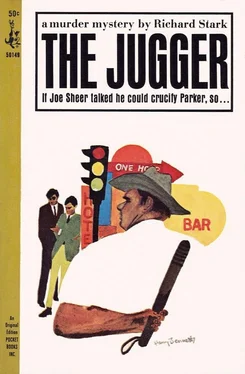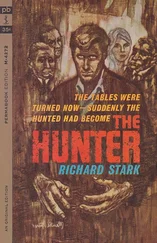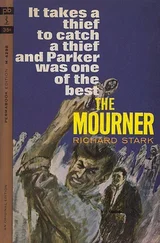And he didn’t know. Neither of his parents was still alive, and he’d been out of touch with any other relatives for decades. He finally told the clerk General Delivery, Sagamore, Nebraska, as a temporary address, because he couldn’t think of anything else. He’d forward a permanent address when he had one.
That was the only reason he went back to Sagamore, to pick up his pension checks. But once there, there was no reason to leave, nowhere else to go, no one anywhere in the world that he wanted to see or that wanted to see him. So he stayed on. He joined the local American Legion Post, and through that got to know some of the better element in town, and settled down to enjoy his retirement.
But he was only fifty. He’d had something to do all his life, donning a uniform every day and going to a specific place and having specific things to do. Time hung heavy, now he was retired. He had no hobbies, and his pension wasn’t lavish. He found he was lying around the house late in the mornings, and going too often to the movies, and spending too much time in front of the television set either at home or down at the bar in the cellar of the American Legion Post. He was drinking too much beer, eating badly, getting too little exercise. He was putting on weight, and his digestion was going bad.
Then the police job came along. He heard talk about it down at the American Legion, about old Captain Greene retiring and wonder who’ll take over, there’s no men with good leadership qualities on the force at all. The pay’s too low to attract first-rate men, somebody said, and that led straight into the old argument about property taxes, but Younger had heard enough.
So now he had the highest rank of all. Not Private Younger anymore, not Pfc Younger, not even Master Sergeant Younger. Captain Younger. Yes, and it could just as well be General Younger, because he was the highest-ranking man on the force. Seventeen men, and he was their captain.
At first he wore the uniform all the time, dark blue with modified riding pants, and boots and a garrison cap. But the weight he’d put on never came off again, and he had to admit he didn’t look good in the uniform. Besides, R.H.I.P. Rank Has Its Privileges. As captain, he could wear civvies if he wanted. As captain, he was the only man on the force who could wear civvies. So he started wearing civvies.
But that made a problem. In the uniform, he was declaring his rank for the whole world to see, but in civvies what was he but just another stocky civilian? He thought about it and thought about it, and finally settled on the cowboy hat. A good ten-gallon hat would set him apart, announce to the world that here was a man who held some rank, that was for sure. A cowboy hat and a good suit, the combination would show he was something special. Besides, he thought he looked good dressed that way.
At fifty-one, he’d reached the peak. Captain of the Police Department, a respected citizen, secretary of the American Legion Post; he was content, he had everything he wanted.
And then he was shown the possibility of wanting a lot more.
It happened almost by accident. In his first months on the force, Younger was working all the time. He revamped the files, worked out a new shift rotation for the men, started correspondence with the county sheriff’s office and various state police offices, and decided to familiarize himself with everyone in town. He wanted to be able to know, just from looking at a man, if he was local or a stranger. If he was local, Younger wanted to know everything there was to know about him; what he did for a living, if he was married or not, if he owned his own home, if he’d ever been in trouble.
Sagamore was a small town, and a dull one. Troublemakers and other lively types left early, and didn’t come back. As a result, making up a mental card file on the town wasn’t very hard, or very interesting, except for one man, one citizen who stood out from all the rest.
Joseph T. Shardin.
The facts about Shardin were few. He owned his home, he was retired, he’d lived in town about five years. He made frequent trips down to Omaha, staying a day or two or sometimes up to a week, and every once in a great while he had a visitor or two at his house, always strangers from out of town. He didn’t have any relatives around here, and no one had ever seen him before he’d come here to retire.
Beyond that, it was all a blank. Younger couldn’t find out exactly what Shardin had retired from. At the bank he learned Shardin had a banking account, and kept it supplied by depositing checks that were dividends on investments or payments on life-insurance policies or Social Security dribbles. But no pension check, from a company or the government, no income to suggest what kind of work he’d done before retiring.
Younger got more and more interested. He wasn’t suspicious at first, just stretching a bit in his new job. He was running a police force, and here was a chance to do a bit of detective work, unravel a mystery. He did it for fun, more than anything else.
Not learning much from the people around Shardin, Younger next tried to learn from Shardin himself. He coached one of his patrolmen, a youngster with an honest, stupid face, and sent him off to see Shardin as a census taker. Among the questions about age and sex and how many occupants in the house, he also asked about Shardin’s background: place of birth, principal occupation, most recent employer, last three addresses. Shardin, according to the patrolman’s report, answered all the questions easily and calmly, and didn’t suspect a thing.
The only thing wrong, the answers didn’t check out.
For place of birth, Shardin had put Harrisburg, Pennsylvania. Younger wrote to Harrisburg, asking for information on a Joseph T. Shardin, born in their city on January 12, 1894. They wrote back there was no record of a Joseph T. Shardin born in their city on that or any other date.
For principal occupation, Shardin had put sports promoter, explaining he had promoted boxing matches, wrestling, roller-derbies, stock-car races, and other sports events in the east, mostly Pennsylvania and New York. Younger wrote to both the Pennsylvania and New York Boxing Commissions, and both wrote back they had no record of any Joseph T. Shardin.
For most recent employer, Shardin had put Midstate Arena Attractions, Inc., Scranton, Pennsylvania. Younger wrote a letter to this company, asking for information on Shardin, and the letter came back with a post office rubber stamp on the envelope: ADDRESSEE UNKNOWN.
All three former addresses Shardin had given were false.
Younger was now sure he’d found a wrong one. Shardin had an income from unknown sources, chose to live in a place where he wasn’t known, and gave a false background.
The next time Shardin went to Omaha, Captain Younger, with a skeleton key, went into Shardin’s house. In the kitchen he set up his fingerprint equipment, the learning about which had been another part of his early enthusiasm for the new job, and from the water glasses in the kitchen cabinet he got three perfect fingerprints. He set up his camera and his white cardboard backdrop, and took three pictures of each print, just to be on the safe side. Then he cleaned up the traces of his having been there, and went back to the station to have the film developed. He mailed a set of the photos to Washington with a covering letter that gave no details but simply asked for whatever identification and information he could get about the owner of those prints, and then there was nothing to do but wait.
A week later a phone call came from the Federal agency office in Omaha. “About a set of fingerprints you sent Washington about a week ago.”
“What about them?”
But the Federal man was calling to ask questions, not to answer them. He said, “What was that inquiry in connection with, Captain?”
Читать дальше












